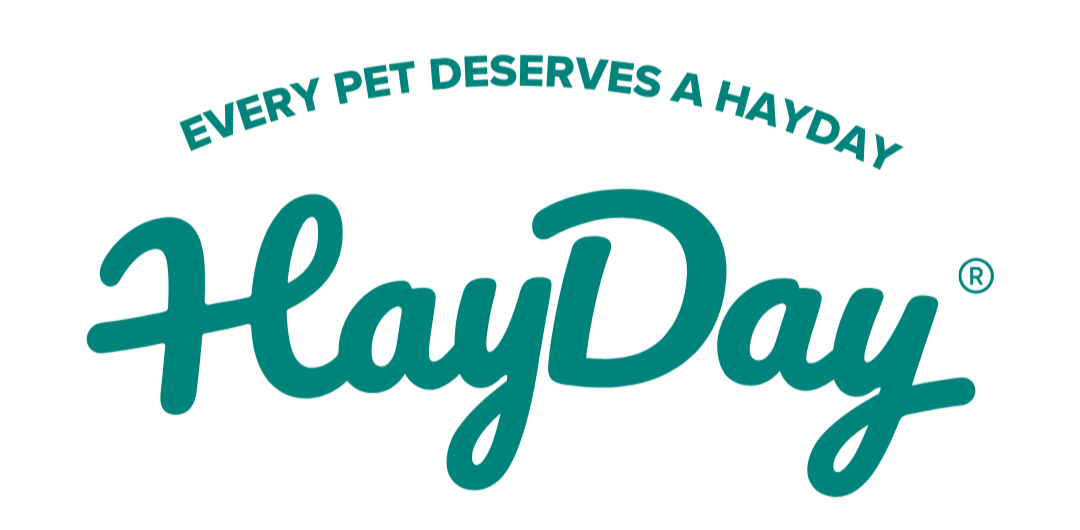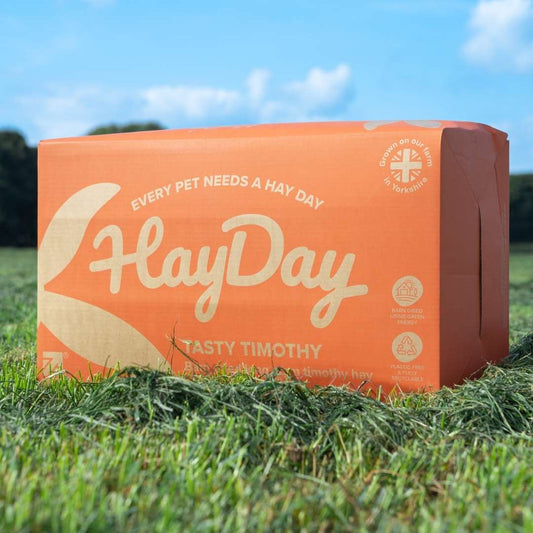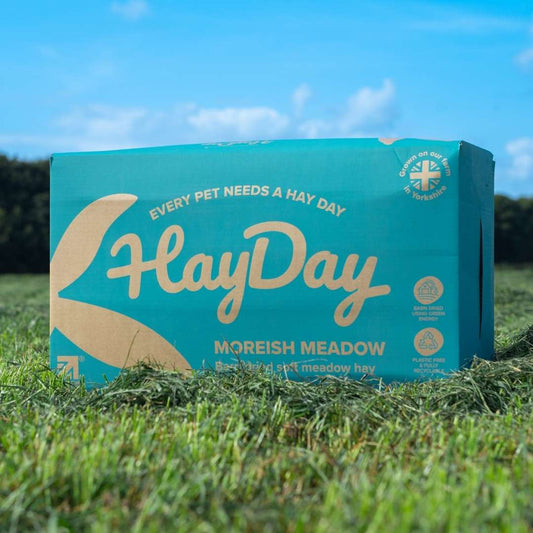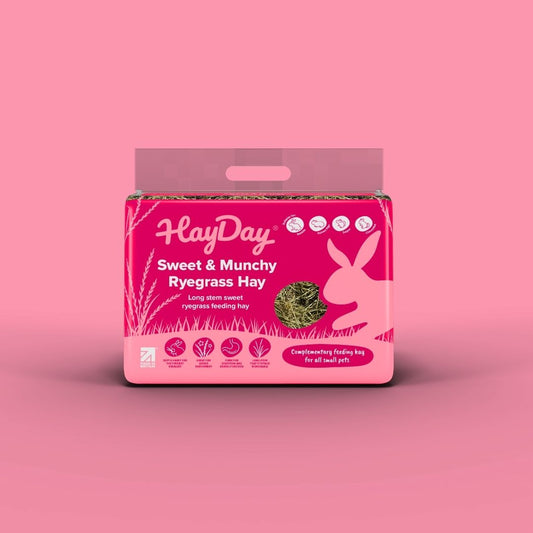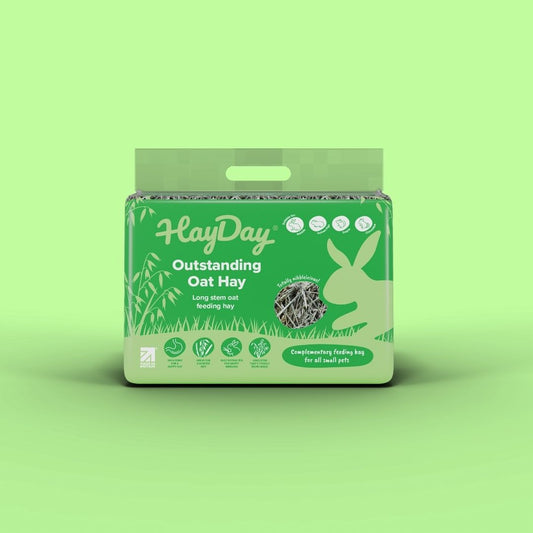Can rabbits eat kale? Yes, but like many additions to your rabbits diet - moderation is key.
This leafy green can be a beneficial part of your rabbit’s diet when fed in the correct way and with the right portion size.
We're experts of hay here at Hay Day, but this guide on kale will take you through the benefits of feeding kale, the possible risks and teach you how to responsibly incorporate it into your rabbit’s diet without disrupting their sensitive digestive system.
Ensuring your rabbit has access to unlimited premium hay, such as our best hay for rabbits, is a great base to their diet.
Kale For Rabbits - Overview
-
Feed kale to rabbits in moderation due to its rich nutrient profile, but be aware of high calcium that could lead to health issues if overconsumed (Redrobe, 2002).
-
Ensure a balanced diet for your bunny with a variety of leafy greens, constant access to premium quality Timothy Hay or Meadow Hay and water - while limiting fruits and avoiding any harmful foods.
-
Follow our recommendations by introducing kale gradually and mixing it with other fresh safe vegetables to maintain your rabbit’s health and prevent dietary imbalances.
Kale in a Rabbit's Diet: Nutritional Benefits and Concerns
Kale, a leafy green from the cabbage family, has gained significant popularity in recent years by rabbit owners for its nutrient dense content. Some of which includes vitamins A, C, and K, calcium, and fibre (USDA, 2024). But does this superfood hold the same benefits for our rabbits?
The answer is yes! Just like collard greens, you should feed kale to rabbits in moderation, introducing greens gradually to their diet.
Like feeding any rabbit safe veggies, kale can significantly contribute to a rabbit’s health by supplying necessary vitamins and minerals that they may not intake from other aspects of their diet. Yet, the high amounts of calcium in kale pose potential risks that we’ll discuss further in this guide (Redrobe, 2002).
Feeding Rabbits Kale: Full of Vitamins and Minerals
Rabbits can benefit greatly from the extensive nutrient profile of kale. It’s rich in vitamins A, C, and K, which play vital roles in vision, immune function, and blood clotting respectively (USDA, 2024).
But the benefits of kale doesn't just stop at vitamins. This leafy green also provides calcium, crucial for rabbit’s bone health and function.
Let's hop into the potential risks of feeding kale...
Potential Risks: High Calcium
While kale’s high calcium content can be beneficial, it also presents potential risks if consumed excessively.
Consistent consumption of high-calcium foods like kale can lead to an accumulation of calcium in the system, which in turn may result in kidney stones in rabbits (Redrobe, 2002; Miller, 2022).
This is because rabbits absorb the full amount of calcium from their food, excreting the excess through their urine.
Introducing Kale to Your Bunny: Best Practices
Wondering how to incorporate kale into your bunny’s diet? Gradual introduction is the answer - not just for kale but for any new foods that you introduce to your rabbit.
Start with small portions of kale, introduced slowly over a period of 7 to 14 days, gradually increasing the amount to allow your bunny to adjust while you observe their digestion. This approach can help prevent potential digestive issues.
As a rabbit parent, always keep an eye on your furry friend for signs of digestive upset, such as diarrhoea or gas, after introducing new foods.
Kale & Ensuring a Balanced Diet for Rabbits
At this point, we'll remind you that our premium barn dried hay is the staple in any rabbits and other small pet's diet. Therefore, while kale can be a nutritious addition to your rabbit’s diet, it’s important to remember that a balanced diet for rabbits goes beyond this leafy green.
A rabbit's digestive health greatly depends on a hay-rich diet, which supplies the fibre necessary for optimal gut function. Some great hay choices are Timothy, Meadow or Ryegrass Hay (with Ryegrass primarily being fed for added enrichment in smaller quantities).
In addition to an unlimited access to hay (80-90% of diet), your rabbit's diet should also consist of:
-
Clean, fresh water available at all times.
-
Fresh vegetables which will enrich your rabbit's diet (avoiding boredom) and deliver vital nutrients. These veggies should form around 5-10% of an adult rabbit’s diet to ensure a balanced intake of nutrients (Miller, 2022).
-
An egg cup full of rabbit specific pellets/nuggets.
Let’s explore these vital aspects of your rabbit's diet in more detail.
Constant Access to Fresh Water
Maintaining a rabbit’s health strongly depends on proper hydration. Rabbits require continuous access to clean water, as their hydration level is critical for digestive health and preventing life-threatening conditions such as GI Stasis.
Water bowls are preferable over bottles for rabbits because they allow for natural drinking behaviour and avoid the risks of clogging or freezing.
Cleanliness is also essential, so be sure to keep water bottles and bowls clean - and free from algae and ice.
Variety is Key: Mixing Leafy Greens
Apart from hydration, a diverse diet is vital for bunnies.
It’s important to feed a variety of vegetables (and fruit in moderation) to prevent boredom for your rabbit. Put it this way, we wouldn't like to eat the same foods 24/7 - so lets treat our rabbits this way too!
A blend of leafy greens supplies essential nutrients and varying tastes and textures, enriching a rabbit’s diet. So, in addition to kale, consider including other approved leafy greens such as:
-
Carrot Tops
-
Romaine Lettuce
-
Parsley
-
Spinach
Beyond Leafy Greens: What Else Can Rabbits Eat?
It's not just leafy greens that your rabbit can enjoy! They can also nibble on a range of different herbs too such as basil, and dill, which are safe for inclusion in their diet.
Nonetheless, not all foods have equal nutritional value for rabbits. Fruits like apples and plums, while tasty, should be considered occasional treats due to their high sugar content.
And some foods should be completely avoided due to potential harm, which we’ll explore next.
Safe Vegetables for Daily Feeding
Non-leafy vegetables, which provide essential vitamins and minerals, are a vital part of a rabbit’s daily diet. Safe non-leafy vegetables for daily consumption by rabbits include celery and cucumber.
Occasional Treats: Fruits and Root Vegetables
Alongside providing your rabbit with a balanced diet of hay and vegetables, occasional treats are also permissible. Fruits such as apple and banana can be given to rabbits in small quantities.
Remember, these are treats and should not make up a significant portion of your rabbit’s diet.
Foods to Avoid: Protecting Your Pet from Harmful Substances
While we’ve discussed many foods that are safe for rabbits to eat, it’s equally important to be aware of the foods to avoid. Certain foods can be harmful or even fatal to rabbits.
Processed foods such as bread, pasta, and cookies can cause digestive upset and obesity in rabbits. Rabbits should also never consume:
-
Dairy products
-
Eggs
-
Meat
-
Any other animal-derived proteins
It’s crucial to keep these foods out of your bunny’s reach to protect them from harm.
Summary
Nourishing your furry friend with a balanced diet is crucial for their health and happiness.
Alongside kale, a rabbit’s diet should include a variety of leafy greens and safe vegetables, with hay forming the bulk of their diet.
Feeding your rabbit isn’t just about providing them with nutritious food. It’s also about monitoring their health, ensuring they have continuous access to fresh water, and enriching their diet with a variety of tastes and textures.
Frequently Asked Questions
What other foods can rabbits eat?
Rabbits can eat vegetables, herbs, fruits, and root vegetables in moderation as treats. Just make sure to introduce new foods slowly, as sudden dietary changes can upset their stomach.
Are there any foods that are harmful to rabbits?
Avoid feeding rabbits avocados, chocolate, meat, eggs, and dairy, as these can be harmful to them.
Reference List
Miller, C. (2022) Small mammal herbivores, part 2: nutrition for wellness. The Veterinary Nurse, 13 (8): 368- 376
Redrobe, S. (2002) Calcium metabolism in rabbits, Seminars in Avian and Exotic Pet Medicine, Volume 11, Issue 2, Pages 94-101.
